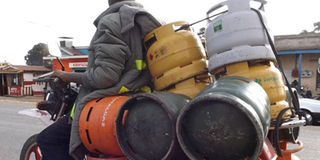Private sector can clean up urban kitchens

A man ferries cooking gas cylinders. In Kenya, most urban households rely on charcoal and kerosene while, globally, 2.8 billion people do not have access to clean cooking fuels. FILE PHOTO | NATION MEDIA GROUP
What you need to know:
The need to grow clean cooking solutions is urgent. By working together, the government and the private sector can ensure Kenya’s future is clean, fair and green.
Increasing, access to affordable modern technologies and cleaner fuels will alleviate the adverse health, environmental and socio-economic impacts of traditional fuels.
- Promoting innovation in the clean cooking space offers a significant contribution towards Vision 2030 and is critical in achieving SDGs, as well as the ‘Big Four Agenda’.
Last week, UN Habitat held its first assembly in Nairobi under the theme “Innovation for Better Quality of Life in Cities and Communities”.
According to the UN, 55 per cent of the world’s population live in urban areas and are set to increase to 70 per cent by 2050. As cities across emerging markets grow rapidly, resources and infrastructure are ever more stretched, posing numerous challenges to governments.
TOXIC SMOKE
In Kenya, most urban households rely on charcoal and kerosene while, globally, 2.8 billion people do not have access to clean cooking fuels. Use of charcoal causes potentially deadly indoor air pollution and carbon monoxide poisoning, while the devastating deforestation it drives continues to destroy our forests and water towers, affecting agricultural yields and weather patterns, thus risking our food security.
Meanwhile, kerosene produces toxic smoke and is associated with explosions and fires, especially in informal settlements.
Although the total economic cost of these unsafe fuels is enormous, they are typically the only viable option for many low-income earners due to their near-ubiquitous accessibility and relative affordability compared to cleaner options.
Increasing, access to affordable modern technologies and cleaner fuels will alleviate the adverse health, environmental and socio-economic impacts of traditional fuels. Promoting innovation in the clean cooking space offers a significant contribution towards Vision 2030 and is critical in achieving the Sustainable Development Goals (SDGs), as well as the ‘Big Four Agenda’.
In recent years, the private sector has demonstrated admirable innovation and leadership in developing clean cooking solutions targeting urban consumers. An increasing number of players now offer sustainable alternatives to traditional charcoal and kerosene cooking methods.
REGULATORY INITIATIVES
The global “2019 Clean Cooking Snapshot” report states that investment in Kenyan clean cooking companies rose to $40 million (Sh4 billion) in 2018. Concurrently, the government has supported the sector through policy and regulatory initiatives, including increasing excise duty on kerosene and imposing a logging ban.
The “2018 World Bank Regulatory Indicators for Sustainable Energy (Rise)” report praised Kenya for supporting provision of sustainable energy.
But despite such success stories, development and adoption of clean cooking solutions is constrained by limited and/or piecemeal government support.
While LPG is VAT-exempt, for example, the upfront equipment costs and ongoing refill bundle sizes are unaffordable for many low-income consumers. Uptake of denatured bioethanol, a promising alternative that is clean and can be purchased in small quantities, has been held back by duties, taxes and tariffs — notably the 16 per cent VAT and 25 per cent import duty — that drive up the retail cost.
The need to grow clean cooking solutions is urgent. By working together, the government and the private sector can ensure Kenya’s future is clean, fair and green.
Mr Osawa is a project director, Partner at Frontier Energy. [email protected]




